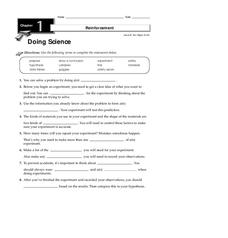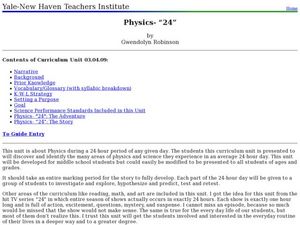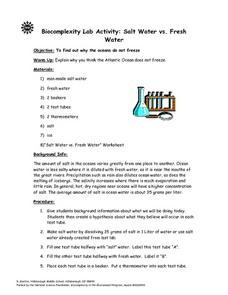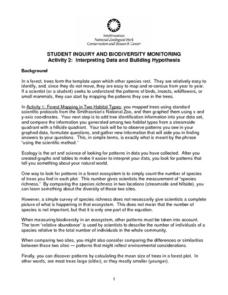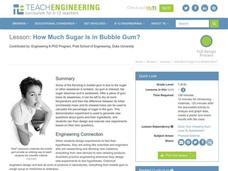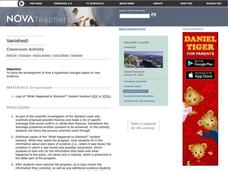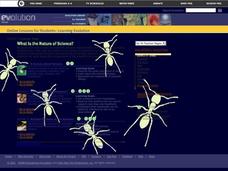Curated OER
Problem-Solving Methods in Biology
In this problem-solving instructional activity, students will read a biologist's observations about elephant communication. Students will write down what the biologist observed, what facts she knew about elephants, and her hypothesis....
Curated OER
Scientific Methods in Biology
For this scientific methods worksheet, students will look at a picture of two different types of mice and create a hypothesis to explain what caused the difference. Then students will write the steps they would take to test their...
Curated OER
Doing Science
In this science experiment process worksheet, students will learn about the steps of conducting a science experiment, including creating a hypothesis, collecting data and drawing a conclusion. This worksheet has 8 fill in the blank...
Curated OER
Primes and Prime Factors
In this primes and prime factors worksheet, 8th graders solve 21 different problems to include identifying each number as prime, composite, or neither prime nor composite and listing all the primes less than 200. Then they complete each...
Curated OER
What Is the Nature of Science?
Students distinguish between scientific and everyday meanings of key words-theory, hypothesis, law, fact-and use in context. They recognize the variables that affect observation, data collection, and interpretation. They discover the...
Curated OER
Physics -- 24
Students record all of the instances of physics and science they are involved with in a full day. As a class, they complete a KWL chart on physics and read a story about Murphy's Law and the character's experiences. Individually, they...
Curated OER
Salt Water vs. Fresh Water
Middle schoolers explore why the oceans do not freeze. They explain why they think the Atlantic Ocean does not freeze. Students are given background information about what they are doing. They create a hypothesis about what they...
Curated OER
Interpreting Data and Building Hypothesis
Students define the term species, and graph species data together with previously collected data at the National Zoo. They interpret graphed data and recognize patterns in the streamside quadrant versus hillside quadrant. Students use...
Curated OER
Lesson 2 Its a Small World (Day 2)
Students are able to explain how the water cycle recycles the earth's water supply. They are able to make use of the knowledge of land forms learned in social studies. Students are able to form a hypothesis on how/why the water cycle...
Curated OER
Beans and Birds: A Natural Selection Simulation
Young scholars solve the following problem concerning the evolution of seed color in pinto bean plants: "How does natural selection change the frequency of genes or traits over many generations?" They use the constructivist approach to...
PBS
Predicting/Making a Hypothesis
Students analyze information from a variety of sources in order to create a hypothesis about the origin of an interesting family artifact.They create alternative hypotheses based upon available information to demonstrate that some...
Curated OER
Does Your Chewing Gum Lose Its Flavor?
Young scholars determine the amount of sugar in various types of gum. They chew a piece of gum until it loses its flavor and leave it to dry in order to weigh it and determine the amount of mass lost, and describe an experiment to...
Curated OER
How Much Sugar is in Bubble Gum?
Students conduct an experiment to determine the percentage of sugar in various types of gum. They weigh the gum after chewing it to determine the amount of mass lost from each piece of gum, analyze the data, and create a graph of the...
Curated OER
Indirectly Direct
Student form and test hyptheses using indirect and direct observation. They launch marbles to determine the shape of a hidden object.
Curated OER
Vanished!
Students view a video clip about the Stardust crash site. They discover how hypothesis change based on new evidence. They research unsolved plane crashes as well.
Curated OER
What is the Nature of Science?
Students examine videos of field researach to discover the components of the scientific process. Using forms, they conduct community surveys about the nature of science. They research the extinction of dinosaurs and compare...
Curated OER
Popcorn Science: Pop Goes the Kernel!
Students conduct various experiments to determine why popcorn pops. They design tests to determine the effect of water in the kernels on its popping. Once the experiments are completed, they write summaries of them proving or...
Curated OER
How to Make a Lake
Students examine the Michigan state quarter and discuss the effects glaciers have on land formation. They perform an investigate using ice cubes and sand to show how glaciers have carved the land.
Curated OER
Capillary Action and Adhesion
Students perform classroom experiments to observe adhesion. They perform a second experiment using sand, salt, water, and a heat lamp to observe the principle of capillary action. They also experiment with adhesion in plants.
Curated OER
BRIDGING THE GENERATION GAP
Students create a hypothesis about the attitudinal differences between generations, test their hypothesis with a survey, chart their findings, and present their answers to the class.
Curated OER
The Scientific Method
If the steps that you follow for the scientific method are as follows, this presentation can be useful: observation, question, hypothesis, method, result. Unfortunately, not every scientist or teacher uses the same terminology, The...
Curated OER
Coal Flowers
Let's make coal flowers! With this fun activity, young learners watch and learn as they grow crystals! With simple household materials and the instructions included in this lesson plan, your class can grow their own crystals. Learners...
Curated OER
Easy Worksheet: Hypothesis and Conclusion 2
In this hypothesis and conclusion worksheet, students solve 6 short answer problems. Students identify the hypothesis and conclusion of a given if-then statement.
Curated OER
Easy Worksheet: Hypothesis and Conclusion 3
In this hypothesis and conclusion worksheet, students solve 6 short answer problems. Students identify the hypothesis or conclusion of a given if-then statement.




